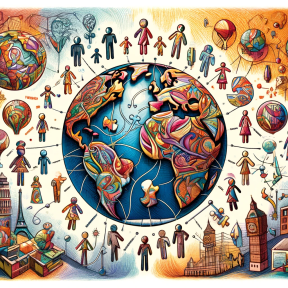Writer Anaïs Nin opined that “Each friend represents a world in us, a world possibly not born until they arrive, and it is only by this meeting that a new world is born.” As Nin conveys, friendship can elicit joy, companionship, and growth—enriching our entire experience of the world.

Children often make friends seamlessly; the settings in which they spend time, such as school, camp, and sports teams, naturally spur fast friendships. It can be harder to make new friends without those built-in mechanisms as an adult, but there are still plenty of ways to create new, enduring relationships.
Adult friendships don’t happen automatically—they require intention, time, and effort. Take initiative by researching a local running group or inviting a coworker to coffee. Throughout the process of getting to know someone, affirm who they are by showing enthusiasm about their interests or complimenting them. Be consistent and reliable, so that the connection solidifies.
Push yourself out of your comfort zone in small ways, such as by asking one question during a meeting or starting one conversation at a party. Reflecting on the discrepancy between how bad you thought past gatherings would be and how bad they actually were can help, too. These ideas and others can soothe the stress of being shy.
Show interest in others by asking questions, and then asking follow-up questions. Open up about your own experiences, stories, and insight as well. Shift topics if the conversation begins to lull, and try to avoid complaining—which people view as one of the top traits that makes someone boring.

Maintaining lifelong friendships provides deep fulfillment and meaning. A few key practices can ensure that those bonds don’t fade over time. Friendships require that both people invest time into the relationship, cultivate trust and honesty, and work through disagreements when they arise.
Strong friendships are built on a foundation of honesty and trust. Providing an honest perspective, repairing ruptures by apologizing or sharing your feelings, and consistently making time for the people you care about are the pillars that support a lifelong connection.
Disagreements are bound to happen over the course of a long relationship. When expressing your concern, show that you want to find a solution rather than alienate the other person. Explain how their actions made you feel, invite them to do the same, and ask for the change you’d like to see. When handled correctly, conflict can strengthen relationships.
Loneliness has physical consequences, from poor cardiovascular and immune health to more stress, especially in old age. Loneliness is difficult to address in one’s later years, so creating a strong community early on is key.

Strong friendships are a critical aspect of most people's emotional well-being. Research indicates that close friendships are associated with greater happiness, self-esteem, and sense of purpose. These bonds are even associated with physical outcomes, such as lower blood pressure and a longer lifespan.
Friendship creates a foundation through which we can develop social skills, advance our careers and romantic relationships, and enjoy compassion and support. Here are 15 ways that friendship can shape well-being.
Research has long revealed that people with close connections are healthier, recover from certain illnesses more quickly, and live longer. New evidence suggests that friendship confers the most benefit during adolescence and old age.















